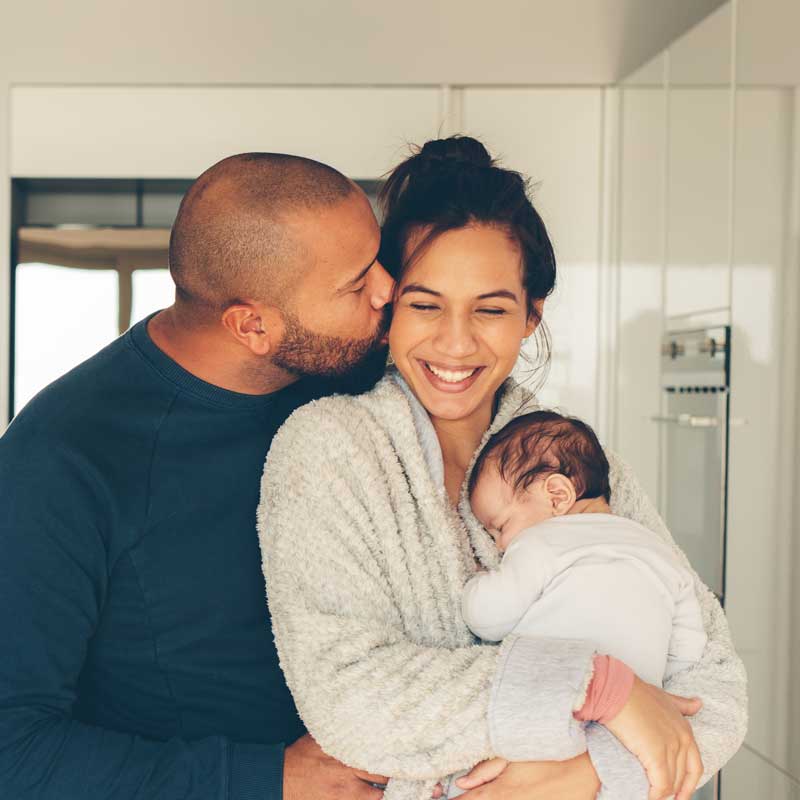Can You Sleep Train Newborns?
No, sleep training is not appropriate for newborns. As a sleep expert, I advise parents to hold off on formal sleep training, like my gentle sleep coaching method (The Sleep Lady Shuffle), until their baby is at least 6 months old. Newborns in their first three months—commonly called the “fourth trimester”—are still adapting to the world outside the womb. Their circadian rhythms are undeveloped, and they cannot self-soothe. Instead, this is a time for what we call Baby-Led sleep shaping, where parents provide a safe, responsive sleep environment and gently establish routines to build the foundation for healthy sleep habits. You can read all about it in Kim’s book, The Sleep Lady’s Gentle Newborn Sleep Guide.

What Sleep Support Looks Like for Newborns
The Fourth Trimester and Bonding
The newborn phase is all about responding to your baby’s needs with love and consistency. Babies are adjusting to life outside the womb and rely on you for comfort and reassurance. Use this time to focus on soothing techniques, building attachment, and gently introducing sleep-friendly habits. Feeding as the Foundation for Sleep Good feeding practices are critical for newborn sleep. Whether breastfeeding, formula-feeding, or a combination, ensuring your baby is well-fed will help avoid sleep disruptions caused by hunger or discomfort. If your baby has challenges like reflux or gas, addressing these issues with your pediatrician or lactation consultant is essential before focusing on sleep
Skin-to-Skin and Swaddling for Comfort
To help your newborn feel secure, practices like skin-to-skin contact and swaddling can be invaluable. Swaddling provides a snug feeling similar to the womb, while skin-to-skin promotes bonding and helps regulate your baby’s temperature and heartbeat.
Routines, Not Schedules
While newborns can’t follow rigid schedules, they benefit from predictable routines. Start with a simple pre-sleep routine that includes calming activities like swaddling, singing a lullaby, or gentle rocking. These signals help your baby associate these steps with sleep and feel more secure.
Drowsy but Awake
Even with newborns, you can begin to practice putting them down “drowsy but awake.” This helps your baby learn to fall asleep in their sleep space without relying on external aids like being rocked fully to sleep. Over time, this small practice sets the stage for self-soothing when they are developmentally ready.
Can Newborns Be on a Schedule?
No, newborns cannot follow a strict schedule. Their sleep patterns are irregular because their circadian rhythms haven’t developed yet. Instead, observe their sleep cues and follow their natural rhythms. For example, newborns can typically stay awake for only 30–90 minutes before needing another nap.
Managing Newborn Twins or Multiples
Caring for twins or multiples can be challenging, but synchronization is key. Try feeding both babies at the same time and waking the second baby if the first wakes up. While you can’t expect a strict schedule, keeping twins on a semi-synchronized routine will prevent parents from being awake 24/7. Get month by month guidance for your multiples with Kim and Natalie Diaz’s book on twins’ sleep: The Newborn Twins Sleep Guide: The Nap and Nighttime Sanity Saver for Your Duo’s First 5 Months.
When to Transition to Sleep Training
For most babies, 6 months is the ideal time to begin formal sleep training. At this stage, their brain and nervous system are mature enough to support learning self-soothing. My Sleep Lady Shuffle is a structured, supportive, and gentle method to help babies fall asleep independently while keeping parents close by to offer comfort as needed. The Shuffle is not like CIO which gives sleep training a bad name.
Some families may start earlier (around 4 months), but only with pediatrician approval and when certain milestones, like longer stretches of night sleep, are already achieved. However, I don’t recommend introducing the Shuffle or other behavioral methods until your baby is ready for success.
What to Do if Your Baby is Struggling with Sleep
If your newborn is having trouble with sleep:
• Check for Basic Needs: Hunger, gas, and dirty diapers are common culprits.
• Observe Sleep Cues: Watch for signs of tiredness, like rubbing eyes or turning away from stimulation.
• Adjust Sleep Environment: Keep the room dark, cool, and quiet to support better sleep.
• Consult Your Pediatrician: Rule out medical issues like reflux or allergies that might disrupt sleep.
The First Few Months
The newborn phase is about patience, bonding, and creating a foundation for healthy sleep. Focus on gentle sleep-shaping practices, respond consistently to your baby’s needs, and know that formal sleep training can wait until 6 months when your baby is developmentally ready. With small, consistent efforts, you’ll be laying the groundwork for long-term sleep success.





